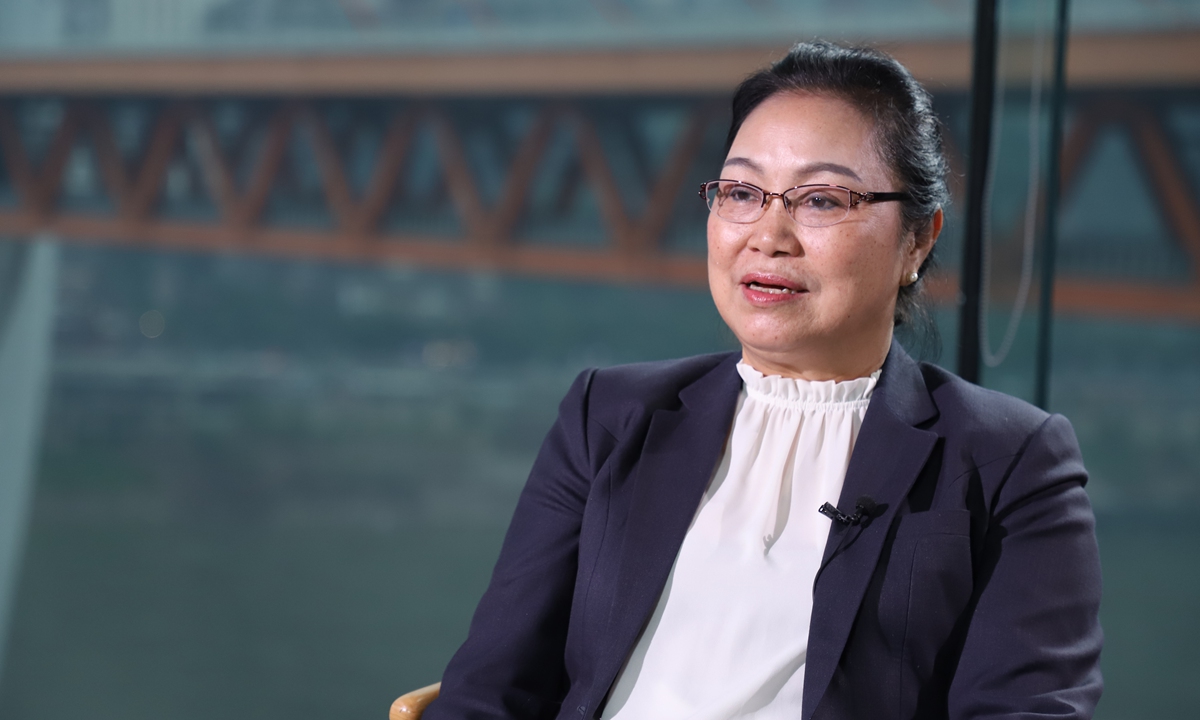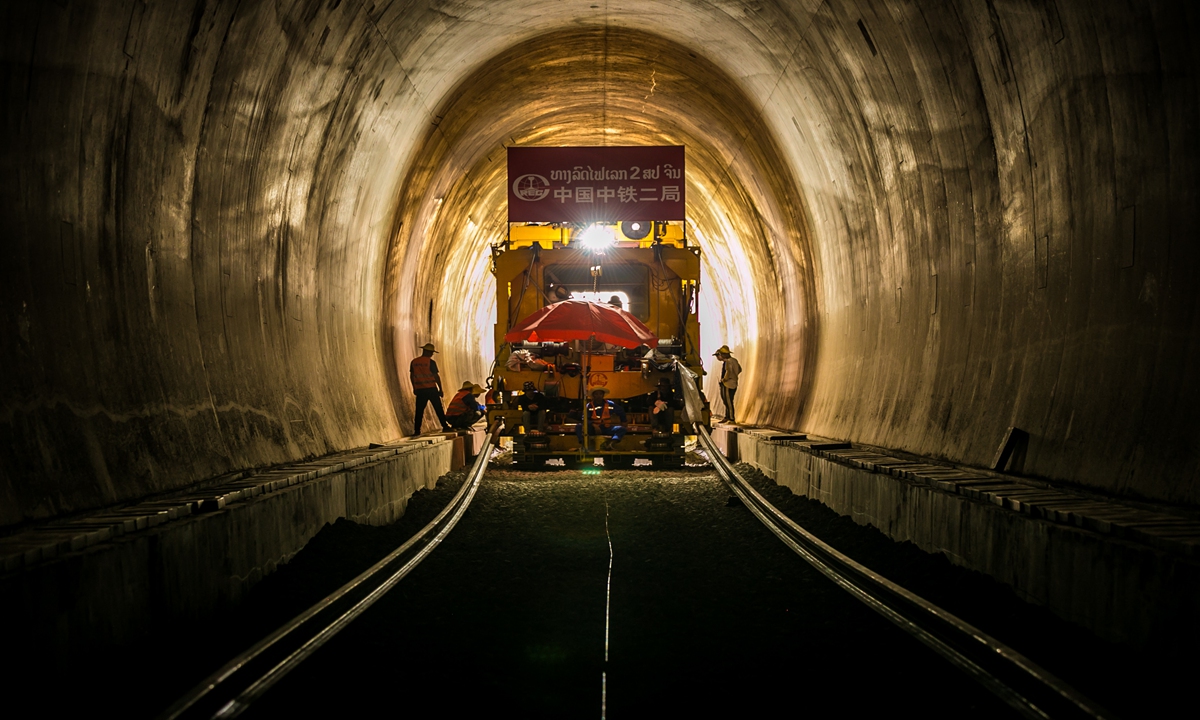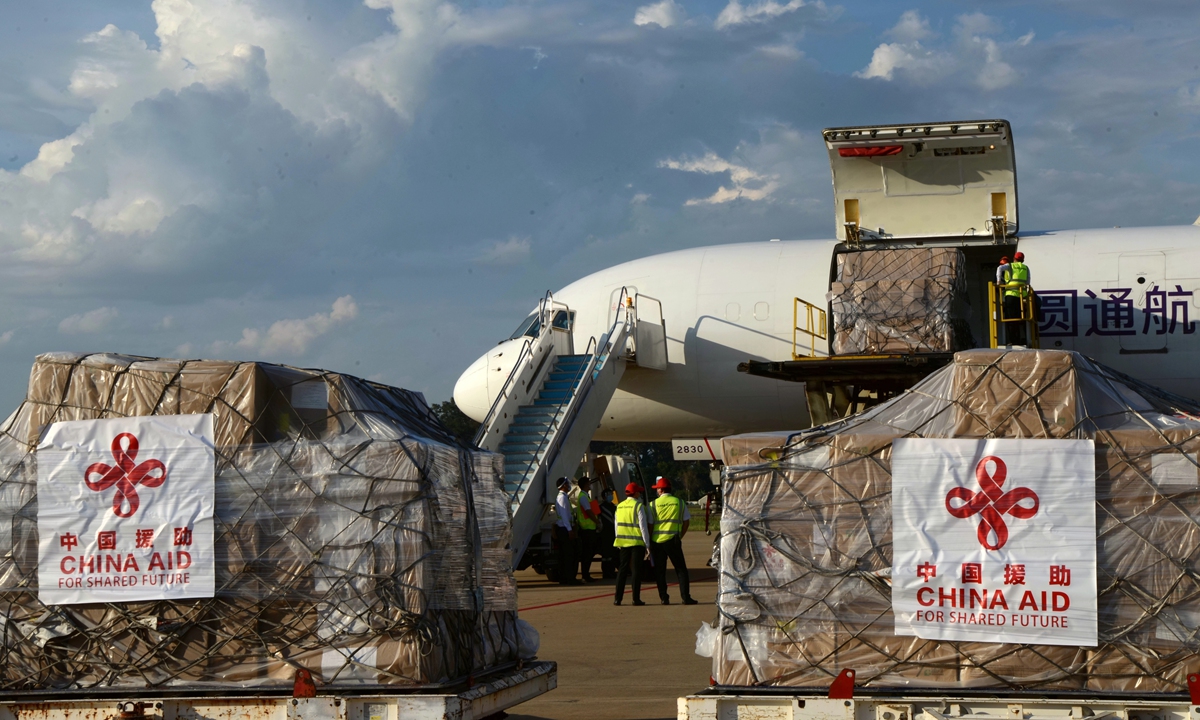Editor's Note:This year marks the 60th anniversary of the establishment of diplomatic relations between China and Laos. And China is celebrating the 100th anniversary of the founding of the Communist Party of China (CPC).
As China's socialist neighbor, what is the key to the CPC's success in the eyes of Laos? How does the nation evaluate the China-Laos relations over the past 60 years? And how will the bilateral ties be further developed? Global Times reporter Yao Lijuan (GT) interviewed Lao Ambassador to China, Khamphao Ernthavanh (Ernthavanh), on a range of issues including CPC's100th anniversary, bilateral relations, and much more.

Khamphao Ernthavanh Photo: Courtesy of Embassy of the Lao People's Democratic Republic
Decoding China through CPC's historyGT: This year marks the 100th anniversary of the founding of the Communist Party of China (CPC). As a senior Lao diplomat, what's your impression of the CPC?Ernthavanh: I've joined in a series of activities held by the CPC and the government of China to celebrate the 100th anniversary of the founding of the CPC.
I traveled to Jiangxi Province where there is an abundance of red resources and visited Jinggang Mountains, known as "the cradle of the Chinese revolution" and Ruijin, where the Provisional Central Government of the Chinese Soviet Republic was located, and also the starting point of the Long March. I also joined with ambassadors to China from 16 countries to attend exchange activities under the theme of "review the history of CPC, and continue traditional friendship" organized by the International Department of the CPC Central Committee.
Participating in these activities makes me deeply understand the history of the CPC, that the Party is the vanguard of the Chinese working class, the Chinese people, and the Chinese nation. It is the leadership core for the cause of socialism with Chinese characteristics and represents the development demands of China's advanced productive forces, which represents the fundamental interests of most people in China. The Party's highest ideal and the ultimate goal is the realization of communism.
GT: What do you think is worth learning from the CPC's century-old development experience?Ernthavanh:The CPC uses Marxism-Leninism and combines the basic tenets of Marxism with China's practical realities and constantly pursues a path that is suited to China's national conditions, as well as taking Mao Zedong Thought, Deng Xiaoping Theory, the Theory of Three Represents, the Scientific Outlook on Development, and Xi Jinping Thought on Socialism with Chinese Characteristics for a New Era as its guides to action which leads to the country's historic progress in economic and social development. China has completed the building of a moderately prosperous society in all respects on schedule and embarked on a new journey toward becoming a modern socialist country.
China's historic achievements have proved that China's socialist path with its own characteristics is the right path for the development of contemporary China and the Chinese people firmly advocate for the leadership of the CPC.
I warmly congratulate the CPC on its 100thanniversary and highly value the great achievements made by the Chinese people under the leadership of the CPC Central Committee with Comrade Xi Jinping at the core. And I strongly believe that the CPC will lead the Chinese people to realize the great rejuvenation of the Chinese nation successfully.
GT: In recent years, some Western media and politicians have viciously attacked the CPC, trying to discredit it. What's your view on that?Ernthavanh:I do believe that people will gain a better understanding of the history of the CPC and gain a deeper understanding of the reasons for China's current development, achievements, and status as a major country in the world. The CPC has always taken the people's aspiration for a better life as its goal and the new and greater contributions to mankind as its mission.
The Party and the government of the Lao PDR highly value the positive contributions made by the CPC to promoting the building of a community with a shared future for mankind. The Lao PDR is ready to deepen its comprehensive strategic cooperation with China, expand friendly exchanges in various fields, and promote sustainable development in building the Laos-China community with a shared future to jointly promote world peace and development.
Lao-China relations entering the best period of historyGT: This year also marks the 60th anniversary of the establishment of diplomatic ties between China and Laos as well as the Year of China-Laos Friendship. What activities has the Lao embassy held to celebrate the event? How do you evaluate today's China-Laos relations?Ernthavanh: This year marks a very significant milestone on enhancing the bilateral relations for the new chapter consistent with the comprehensive strategic partnership of cooperation with four good spirits namely: Good neighbors, good comrades, good friends, and good partners.
I am highly delighted and positive about the long-standing traditional bilateral relations between the two parties, two governments, and peoples of the two countries, which have grown continuously, strongly, and have reached a new level as entering the best period of history.
Despite the difficulty of the COVID-19 pandemic outbreak globally, Lao PDR and the People's Republic of China maintained close high-level inter-party and governmental exchanges. Our top leaders keep the momentum of cooperation via new platforms of exchanges, providing a favourable atmosphere to promote political cooperation and advance mutual tasks between our two countries.
On this auspicious occasion, the Embassy of the Lao PDR had collaborated with many core organizations from China to host many activities to celebrate this important anniversary, including a dinner banquet co-hosted by the Embassy of Lao PDR and the Chinese People's Association for Friendship with Foreign Countries. Moreover, the Embassy will collaborate with ASEAN-China Center and other development partners to co-organize various activities to celebrate this wonderful milestone, such as the Ambassador's Lecture, Magazine Publications, exhibition, and others.
Lao PDR has always cherished the Laos-China friendly relations and is willing to carry forward long-standing traditional friendship with China, deepen pragmatic cooperation as the comprehensive strategic partnership and make concrete progress in building the Laos-China community with a shared future.
GT: At present, China and Laos have expanded new cooperation in new areas such as petrochemical and beef export. In what key areas will Laos continue to promote cooperation with China? Ernthavanh: As you are aware, the cooperation between the Lao People's Democratic Republic and the People's Republic of China has expanded and strengthened in many new areas in this new era. During the difficulty of the COVID-19 pandemic outbreak, Lao PDR and China have supported each other in public health cooperation. The government of China provided assistance and support to Lao central and local authorities, such as provided Laos with 2 million doses of the COVID-19 vaccine and sending medical experts from China to join the prevention and control efforts.
Lao PDR together with China will continuously maintain the momentum of two-way trade cooperation including the implementation of tariff elimination of 97 percent of Lao products export to China, enhancing the people-to-people exchanges, continuing to support the Belt and Road Initiative (BRI), and strengthening cooperation from the central to local levels comprehensively.
Trade and investment cooperation should be further promoted and strengthened in order to implement our leaders' agreement as well as to enhance bilateral relations to realize the tangible benefit for the people of the two countries.
GT: What's Lao's expectation for participating in the BRI? Does the COVID-19 epidemic affect the ongoing BRI projects in Laos?Ernthavanh: Lao PDR has paid important attention to supporting the Belt and Road Initiative since the beginning, with the aim of integrating it with Lao PDR's strategy of "Transforming from land-locked Country into the land-linked Country."
Lao PDR has a great expectation from the implementation of BRI which brings more opportunities for Lao PDR in terms of social and economic development and also creates a platform for deepening Lao-China governmental cooperation.
During the past few years, there have been a lot of projects implemented under the BRI in Laos, of which the Lao-China Railway Project is one of the most symbolic and marks a milestone of the Laos-China friendship in the new era.
The COVID-19 epidemic in Lao PDR at this moment has created some challenges for the government. Governmental bodies are making every effort to tackle the impact. I assumed that some projects under BRI might to some extent be affected, but the impact may not be that serious. For example, the Lao-China Railway Project has been smoothly progressing and is expected to be completed as planned.

Workers from China and Laos work together to lay the track for the first tunnel of the Lao-China Railway at the construction site in Vientiane on May 23, 2020. Photo: Xinhua
GT: Do you have the latest timetable of when the railway will complete construction and be launched? What do you expect most once it goes into operation?Ernthavanh: Up till May 2021, on the Lao PDR side, the fundamental works of railway construction had been smoothly progressing and it is estimated that over 96.3 percent of the plan has been completed, according to the report of the Ministry of Public Work and Transportation of Lao PDR. Other tandem works, such as the movement of obstacles and the building of facilities along the railway are ongoing with the estimation of more than 70 percent completion. I believed that the China side also has very outstanding progress.
We believe that the railway will be completed and be launched by the end of this year.
The railway project will make a significant contribution to the implementation of the Lao government's socio-economic development plan to accelerate the eradication of people's poverty, as well as promote tourism and stimulate economic growth between the two countries and other nations in the region.
GT: Some Western media outlets hyped that many of the countries participating in the BRI are falling into a "debt trap." What's your take on that?Ernthavanh: From our understanding, BRI is a long-term policy and investment program which is aimed at infrastructure development and the acceleration of the economic integration of participating countries. BRI encourages and promotes intergovernmental cooperation, policy exchange, and communication mechanism. Moreover, BRI will create a chance for improvement of connectivity of infrastructure construction and technical standards system, which is crucial for the socio-economic development of a small landlocked country like Lao PDR.
Therefore, we strongly believe that, even though there may be some challenges, the BRI will bring more opportunities for the participating countries.
GT: The Chinese government formally ratified the Regional Comprehensive Economic Partnership (RCEP) in March. How is ratification of the deal progressing in Laos? There are some talks on the stimulating effect on China-ASEAN trade and the economic cooperation brought by RCEP plus the China-ASEAN?Free Trade Area (CAFTA) when RCEP comes into effect. What's your take on that?Ernthavanh: We congratulate China, Japan, and Singapore who have completed their domestic procedures and have ratified the said agreement. We're expecting the ratification process in Lao PDR to be completed with approval at the upcoming National Assembly Meeting at the end of this year.
In terms of RCEP effects on other FTA such as CAFTA and other regional frameworks, we believe that the openness and challenges in RCEP together with the implementation of the agreement will prove that the cooperation within this framework will enable small economies such as that of Lao PDR to compete for investment opportunities from member countries, especially by taking advantage of the single production basis of the framework, as well as using the priority under the least developed countries to support the future economic and trade cooperation.
Of course, some challenges may remain, so member states need to prepare and improve basic economic infrastructure to cope with increased competition and other challenges that may occur, such as compliance with international trade measures and standards, for example, the Sanitary and Phyto-Sanitary (SPS) and Technical Barriers to Trade (TBT) issues. That's a major challenge for Lao PDR.
I do believe that under the cooperation, supports, and technical assistance within the RCEP member states, this agreement will bring benefits to the people of all member states in the future.
GT: China has promised to give priority to Mekong River countries in providing COVID-19 vaccines amid the epidemic. As you have mentioned, 2 million doses of the COVID-19 vaccine have been sent to Laos by China. How is the distribution of Chinese vaccines going in your country? What other anti-epidemic cooperation has been carried out between China and Laos? How do you think of the efforts?Ernthavanh: The party and government of Lao PDR and PR China had been working closely from the very beginning to prevent and control the COVID-19 epidemic outbreak.
Recently in Lao PDR, more than 600,000 people received their first doses of the vaccine and more than 300,000 people have been fully vaccinated after having received their second dose of the Chinese vacancies. Besides the vaccines and exchanges between medical experts for purposes of prevention and control, the two governments have also agreed to launch a fast track for essential workers and for trade facilitation to maintain the free flow of goods and continuing cooperation in dealing with work plans agreed upon by the leaders of the two countries.
On this occasion, I would like to sincerely thank and appreciate the Party, government, and people of China for this important support extended to Lao PDR in the difficult time.

Lao workers load Chinese-donated anti-COVID-19 medical supplies at Wattay International Airport in Vientiane, Laos, on May 10, 2020. Photo: Xinhua
GT: As for the Lancang-Mekong Cooperation (LMC), what role do you think China plays and could potentially play?Ernthavanh: China has played a very important role together with other Mekong countries in the LMC-led mechanism. Over 500 projects under China's special fund have been implemented successfully to the tune of $300 million. The LMC National Secretariat and other related authorities in China and other Mekong countries have served as the coordination and implementation unit and could benefit in all aspects from central to local including the realizing of the five-year work plan of the LMC.
On the occasion of the 5th anniversary of the LMC, I highly value the significant outcome of LMC cooperation over the past five years among the three pillars and five priority areas that brought effective benefits to our people as well as the 2030 agenda of UN sustainable development goals. In this connection, I would like to thank the government of China for its enduring support over the past five years of the LMC cooperation. I strongly believe that China will continuously support the LMC cooperation in order to contribute to regional and international interests.






